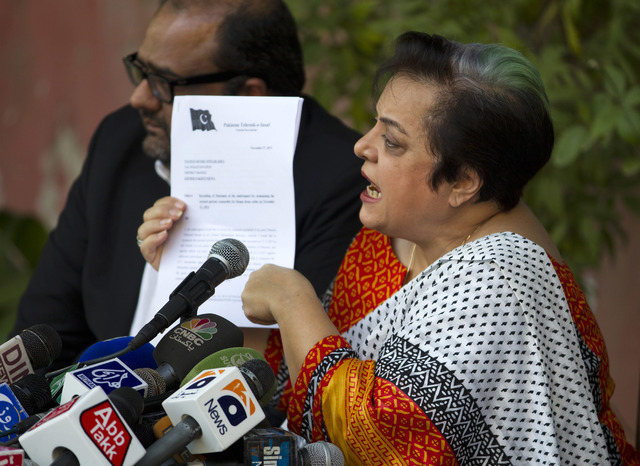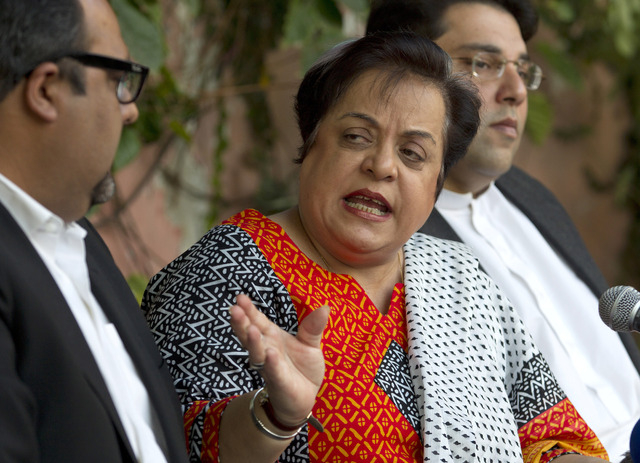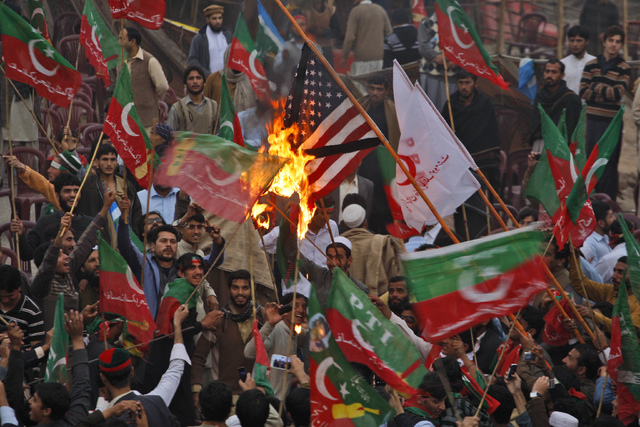CIA chief revealed as Pakistan battles against drone strikes
ISLAMABAD — A Pakistani political party launched an attack on the CIA drone program on Wednesday, turning up the heat on an issue that the government in Islamabad has tried to manage without sparking a crisis with the U.S. The party revealed what it said was the name of the CIA’s top spy in the country and called for him to be tried for murder.
U.S. missile attacks targeting Islamic militants in Pakistan’s northwest have long been a source of tension between the two countries, complicating an already troubled alliance that Washington is relying on to help negotiate an end to the war in neighboring Afghanistan.
Friction has increased in recent weeks with a pair of especially contentious strikes: one that killed the Pakistani Taliban’s leader as the government prepared to invite him to hold peace talks, and another that occurred outside the boundaries of the country’s tribal region where most attacks have taken place.
But the U.S. has shown no willingness to abandon a tool it views as critical to fighting al-Qaida and Taliban militants based in Pakistan who are outside the reach of American soldiers.
Pakistani officials regularly criticize the strikes as a violation of the country’s sovereignty and say they kill too many civilians. That has made the drone program very unpopular with the Pakistani public. But the Pakistani government and military are known to have secretly supported at least some of the attacks in the past.
One of the biggest drone critics has been the Pakistan Tehreek-e-Insaf party, which is led by cricket star Imran Khan and controls the government in northwest Khyber Pakhtunkhwa province. Pakistan Tehreek-e-Insaf has pushed the federal government, which is controlled by a rival party, to take extreme measures like cutting off the NATO troop supply line to Afghanistan until the U.S. stops the attacks.
Pakistan Tehreek-e-Insaf’s information secretary, Shireen Mazari, sent a letter to police Wednesday calling for the CIA station chief in Islamabad and agency director John Brennan to be tried for murder and “waging war against Pakistan” in connection with a drone strike on an Islamic seminary in Khyber Pakhtunkhwa’s Hangu district on Nov. 21.
CIA spokesman Dean Boyd would not confirm the Islamabad station chief’s name and declined to immediately comment. The Associated Press is not publishing the name given by Mazari because it could not verify its authenticity.
It was the second time in recent years that Pakistanis opposed to drone strikes targeting Islamic militants have claimed to have revealed the identity of the top CIA spy in the country.
Mazari claimed in her letter that the station chief did not enjoy diplomatic immunity and should be prevented from leaving the country. Interrogating him could produce the names of the pilots who fly the drones, she said.
A spokeswoman for Pakistan Tehreek-e-Insaf, Anila Khawaja, declined to say where the party obtained the station chief’s name.
Mazari said in a news conference that the strike in Hangu killed four Pakistanis and two Afghans, and also wounded children.
Pakistani intelligence officials say the attack killed five Afghan militants, one of whom was a deputy to the leader of one of the most dangerous groups fighting American troops in Afghanistan. The officials spoke on condition of anonymity because they were not authorized to talk to journalists.
The Hangu district police chief, Iftikhar Ahmad, said at the time of the attack that no one was seriously wounded.
The strike was one of the first to take place outside of Pakistan’s tribal region and outraged members of Pakistan Tehreek-e-Insaf.
Human rights organizations have also criticized drone strikes in Pakistan, questioning their legality and saying they have killed hundreds of civilians. The U.S. rarely discusses the covert drone program in Pakistan publicly, but officials have insisted it’s legal and that the civilian casualty figures are much lower.
Pakistan Tehreek-e-Insaf pledged on Saturday to block trucks carrying NATO troop supplies to and from Afghanistan until the U.S. ended drone attacks. Protesters stopped trucks and roughed up drivers before the police intervened to stop them. The NATO supply trucks remain stuck though, because transportation officials are still worried about what protesters will do.
The CIA pulled its top spy out of Pakistan in December 2010 after a Pakistani lawsuit accused him of killing civilians in drone strikes. The lawsuit listed a name lawyers said was the station chief, but the AP learned at the time it was not correct. Nevertheless, the CIA pulled the station chief out of the country after militants threatened to kill him.
It’s rare for a CIA station chief to see his cover blown. In 1999, an Israeli newspaper revealed the identity of the station chief in Tel Aviv. In 2001, an Argentine newspaper printed a picture of the Buenos Aires station chief and details about him. In both instances, the station chiefs were recalled to the U.S.
The station chief in Islamabad operates as a secret general in the U.S. war against terrorism. He runs the Predator drone program targeting terrorists, handles some of the CIA’s most urgent and sensitive tips and collaborates closely with Pakistan’s Inter-Services Intelligence agency.
The CIA station chief who ran operations in Pakistan during the raid that killed Osama bin Laden left his post in 2011 due to illness, U.S. and Pakistani officials say. American officials said at the time that the station chief clashed with the U.S. ambassador in Pakistan, who objected to CIA drone strikes during diplomatic negotiations.
———
Associated Press writer Lara Jakes in Washington contributed to this report.
























